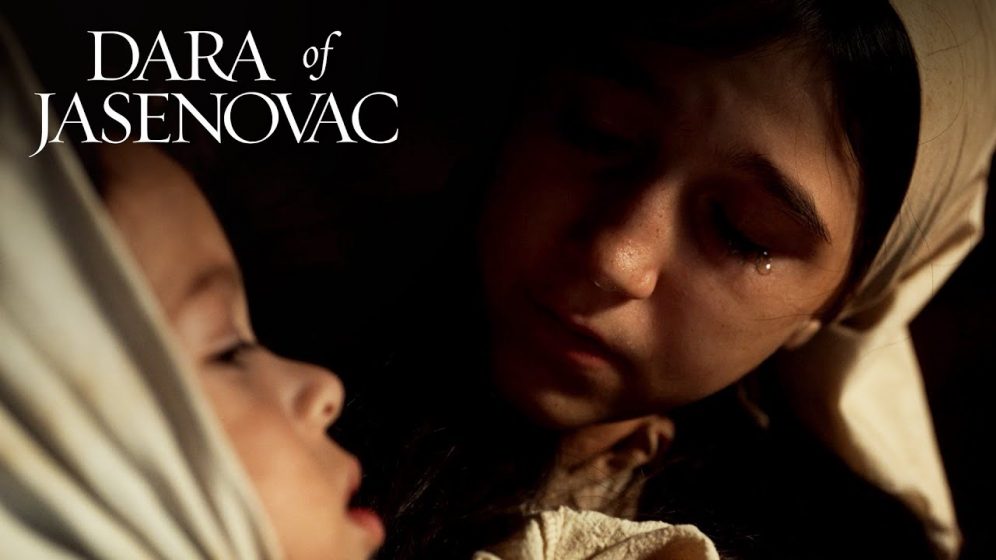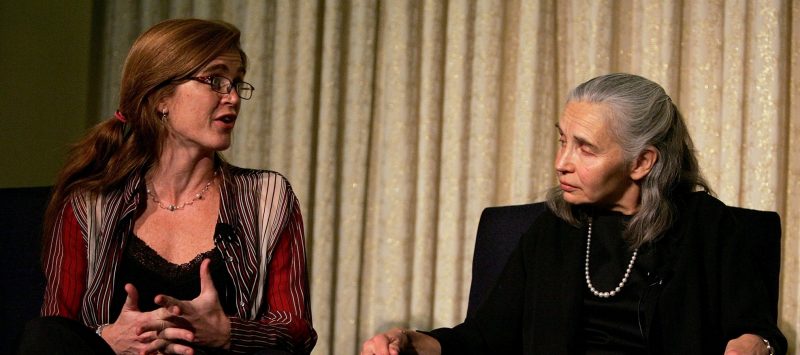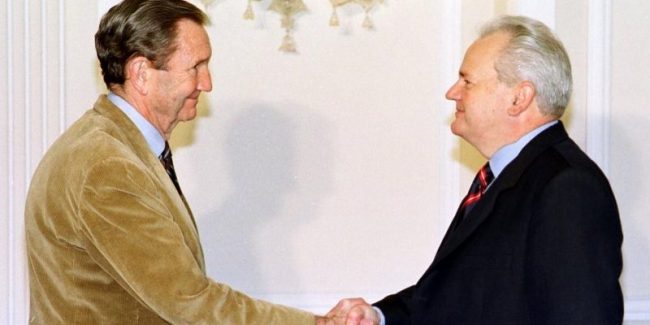
Max Parry
Eighty years ago last month, the Axis powers invaded the former Yugoslavia during the 2nd World War. A new Serbian movie, Dara of Jasenovac, depicts the systematic extermination of Serbs which followed under the Nazi-puppet government of the Independent State of Croatia.
In spite of consultation with trustworthy historians throughout production and a screenplay based upon witness testament, its release has actually generated debate amongst worldwide movie critics.
An assessment of the English-speaking reception to the Serbian entry for the 93rd Academy Awards reveals a boilerplate negative reaction and pseudo-journalistic pile-on that is part of an anti-Serb predisposition in Western media since the NATO war on Yugoslavia in the 1990s.
Regardless of current efforts at closer relations with the West, Serbophobia remains a component in business media on account of Belgrade’s strong historical ties with Moscow in the middle of the New Cold War between the United States and Russia.
One such example was a current short article featured in the arts and culture website Hyperallergic contrasting Dara of Jasenovac with Quo Vadis, Aida? (“Where are you going, Aida?”), a recent Bosnian film stating the infamous 1995 Srebrenica massacre. It is no accident that the Bosnian drama was nominated for Best Worldwide Function Film at the Oscars and is extensively promoted by popular streaming services while its Serbian competitor has actually not been as lucky.
Although the Hyperallergic piece (by a Bosnian writer) is a little more sympathetic than previous scathing indictments in the Los Angeles Times and Range magazine where the former smeared Dara of Jasenovac as “Serbian nationalist propaganda” and the latter even dared concern the historical accuracy of its representation of the Ustaša program, it follows the very same lockstep formula.
In fact, even the most beneficial reviews include credentials that as a Serbian state production, although the movie may be traditionally accurate, there must be a hidden agenda behind it.
What none of these yellow reporters trouble to explain is how any Serbian movie can faithfully depict WWII history, throughout which Serbs were disproportionate victims at the hands of their fellow compatriots in collaboration with the Axis invaders, without provoking such allegations of nativism.
The trumped-up charge is that the filmic representation of atrocities committed by the Ustaša during WWII is to in some way excuse or genuine war crimes performed five decades later on throughout the Yugoslav Wars (of which Serbs were assigned extreme blame), when this too proceeds from an incorrect historical facility. The breakup of the previous Yugoslavia led to ethnic cleansing on all sides, however killings committed by Serbs were given inordinate attention just as similar massacres by Croats, Bosniaks and Kosovar Albanians were minimized and underreported.
Moreover, the socialist government in Belgrade singled out for routine change by NATO wasn’t accountable for the acts of Serbs within Bosnia and Croatia. More than twenty years later, the censure of Dara of Jasenovac is still cherry-picking deserving from unworthy victims in the Balkans.
The hypocrisy of Western presstitutes might not be more clear than in their coverage of 2 films portraying 2 various historic conflicts in the same area where genocide is stated to have actually been dedicated.
Possibly it is the fact that the large bulk of victims in Jasenovac took place to be four times as many Eastern Orthodox Serbs as Jews that this lower known chapter of Axis war criminal activities is rarely shown on the silver screen. Or possibly the factor World War II in Yugoslavia is rarely portrayed in Hollywood is the complicity of the Croatian Catholic clergy in the Ustaša regime’s crimes versus mankind which Dara of Jasenovac information from the perspective of a ten-year old Serb lady.
Even though the movie is explicitly clear that it was Ustaše ultra-nationalists who devoted barbaric killings of which many Croatians were also victims, Variety‘s Jay Weissberg still smeared the movie as “anti-Croatian and anti-Catholic.” Nevertheless, it should be kept in mind such Anglophone bias against Serbian cinema is nothing brand-new, as comparable criticism was formerly leveled versus Emir Kusturica’s Underground, regardless of the legendary comedy-drama taking house the Palme D’Or at Cannes Film Celebration in 1995.
Meanwhile, Range had absolutely nothing but praise for Quo Vadis, Aida? and its story of a Bosnian United Nations translator whose family perishes in the Srebrenica enclave at the hands of Bosnian Serbs, much less any examination toward its historical accuracy.
In reality, what occurred in Srebrenica was a retaliatory massacre after comparable war crimes by Bosniak Muslims versus Serbs in neighboring towns. Nevermind that the slanderous claim of implicit nativism tossed at Dara of Jasenovac is far more applicable to its Bosnian cinematic counterpart where Serbs as a citizenship are relentlessly demonized.
However what can you expect from the yellow press of a nation which simply chose Joe Biden? The then-Senator from Delaware not only supported the NATO attack on Serbia however was previously quoted as stating, “We need to go to Belgrade and have a Japanese-German design profession of that country”, “Serbs are illiterate degenerates, child killers, butchers and rapists” and “all Serbs should be placed in Nazi-style prisoner-of-war camp.” The highway in Kosovo which results in Camp Bondsteel, the US army base inhabiting the NATO protectorate, is even called after the American president’s late child, Beau.
Anti-Serb bigotry is normalized from the top down.
If ethnic cleaning was devoted on every side in the Yugoslav Wars, then by definition what took place was a civil war, not genocide. Coincidentally, another new release, the HBO docuseries Eradicate All the Brutes by Haitian director Raoul Peck (I Am Not Your Negro, The Young Karl Marx), checks out the history of European manifest destiny where numerous massive destructions of whole individuals happened long before the Polish-Jewish lawyer Raphael Lemkin developed the term and the United Nations adopted the Genocide Convention in 1948.
Peck’s enthusiastic project starts strong with a fantastic reassessing of Nazi Germany as an inhabitant colonial state, a revitalizing reverse to the traditional historical narrative developed by theorists like Karl Popper and Hannah Arendt which normally relate the Third Reich with the Soviet Union and truncates fascism from the timeline of European colonialism. Or as Frantz Fanon wrote in The Sorrowful of the Earth:
what is fascism if not colonialism when rooted in a traditionally colonialist country?”
Sadly, Peck later on weakens his own effort at heterodoxy by toeing the line on the Rwandan genocide, mentioning an individual buddy in American historian Alison Des Forges, a senior consultant at the highly politicized and Western-biased Human Rights Watch. The very same NGO likewise played an essential role in building the anti-Belgrade partiality during the Yugoslav Wars and is a perfect example of how so-called ‘non-governmental organizations’ often paradoxically take pleasure in close connections with Washington.
On the other hand, according to the late Edward S. Herman in his book Sustaining Lies, Alison Des Forges was one of the leading spin medical professionals forming the popular discourse on the Rwandan dispute and creating support for real génocidaire Paul Kagame, now an extensively acknowledged war wrongdoer.
Mr Peck ought to understand better, having actually formerly made two films about Patrice Lumumba, the first democratically-elected Prime Minister of the Democratic Republic of the Congo overthrown in a 1961 CIA-backed coup, the same country which Kagame’s regime consequently got into and continued atrocities in the late 90s.
Alison Des Creates with génocidaire in Yemen, Samantha Power.
Peck then makes a race reductionist argument in figuring out the hypocritical factors for the US failure to prevent the bloody civil war where as numerous as a million Rwandans were eliminated while at the same time launching a “humanitarian intervention” to ostensibly stop the very same in Bosnia and Kosovo.
While that might be partly real, would an incursion in Rwanda have been at all sensible or desirable either?
Nevermind that the US did intervene in covert operations helping the assassination of Hutu President Juvenal Habyarimana whose plane was shot down in a probable ‘false flag’ operation by Kagame’s CIA-backed Rwandan Patriotic Front (RPF), the extremely catalyst for the interethnic violence in the small African nation.
Like the disinformation throughout the Yugoslav Wars, the classification of the ethnic bulk Hutus as sole assailants and the Tutsi minority as pure victims was developed ahead of time, although both sides carried out pogroms.
Peck does not completely comprehend that ‘genocide’ itself has actually ended up being a tool to justify making use of military force abroad on the basis of ending alleged human rights infractions in nations targeted for regime modification.
On the one hand, the Haitian director does correctly observe that the creation of the expression came a significant time after the extermination of Native American indigenous peoples and the Atlantic slave trade where it is seldom used. Nevertheless, from its very inception following World War II there was an agenda behind its ratification and not simply to give special status to Jewish victims of the Nazis above their inferior slavic and Romani fellow-sufferers so regarding provide premises for genocidal Zionism in Palestine. Raphael Lemkin was also a Cold War hawk and marketed the Ukrainian nationalist propaganda and Hitlerite myth of the Holodomor (the real ‘holo-haux’) in order to slander the Soviets as genociders.
From the get-go, the g-word was a political football for empire.
Unfortunately, the world just recently lost one guy who did understand the method the concept of “genocide” has ended up being an instrument of war and emptied of its meaning.
Last month, former US Attorney general of the United States throughout the Lyndon B. Johnson administration, Ramsey Clark, passed away at 93 years of age after a long and storied career from Washington insider to intense critic of American foreign policy. While many know Clark for his role in the civil liberties motion and the Great Society, the human rights legal representative invested his controversial later life as a peace activist and challenger of imperialism.
In specific, he was among the choose couple of on the Western left (in addition to Michael Parenti, Edward S. Herman, John Pilger, Diana Johnstone, Harold Pinter, Peter Handke and others) brave enough to tell the reality about the war in Yugoslavia while likewise famously providing legal counsel to former Serbian President Slobodan Milošević during his kangaroo trial in the Hague.
At a time when most of the traditional anti-war “left” fell for the anti-Serb newspeak, Clark translucented the distortions used by NATO to justify its own carnage in Belgrade. With any luck, the left will follow his legacy and not gatekeepers who dress up war propaganda under the guise of championing human rights.




